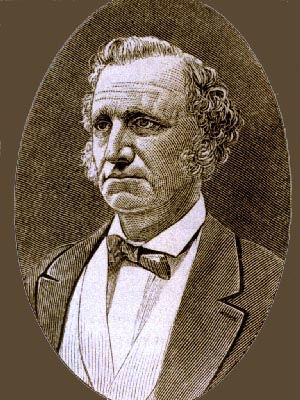Benjamin Flanders facts for kids
Quick facts for kids
Benjamin F. Flanders
|
|
|---|---|
 |
|
| 31st Mayor of New Orleans | |
| In office April 4, 1870 – November 29, 1872 |
|
| Preceded by | John R. Conway |
| Succeeded by | Louis A. Wiltz |
| 21st Governor of Louisiana | |
| In office June 8, 1867 – January 8, 1868 |
|
| Lieutenant | Albert Voorhies |
| Preceded by | James M. Wells |
| Succeeded by | Joshua Baker |
| Member of the U.S. House of Representatives from Louisiana's 1st district |
|
| In office December 3, 1862 – March 3, 1863 |
|
| Preceded by | vacant |
| Succeeded by | vacant |
| Personal details | |
| Born | January 26, 1816 Bristol, New Hampshire |
| Died | March 13, 1896 (aged 80) Lafayette Parish, Louisiana |
| Political party | Republican |
| Spouse | Susan H. Sawyer |
Benjamin Franklin Flanders (born January 26, 1816 – died March 13, 1896) was an important person in New Orleans, Louisiana. He was a teacher, a farmer, and a politician. In 1867, during a time called Reconstruction, he became the 21st Governor of Louisiana. He held this job for about six months. He was also the second and last Republican mayor of New Orleans.
Contents
Early Life and Education
Benjamin F. Flanders was born in Bristol, New Hampshire. When he was 26 years old, he finished his studies at Dartmouth College in New Hampshire.
In January 1843, he moved to New Orleans. There, he started studying law with Charles M. Emerson. The next year, he decided to become a schoolteacher and a principal instead. In 1845, Flanders became the editor of a local newspaper called New Orleans Tropic. In 1847, he married Susan H. Sawyer in Bristol, New Hampshire. They moved back to New Orleans and had six children together.
Political Career and Public Service
Flanders became very involved in politics. From 1847 to 1852, he was elected as a city council member (called an alderman) for the 3rd Municipal District of New Orleans. In 1852, he became the secretary and treasurer for the New Orleans, Opelousas and Great Western Railroad company. He worked there until 1862.
During the Civil War
In 1861, Benjamin Flanders left New Orleans for safety. He did not agree with states leaving the Union, and people who supported the Union were not popular in New Orleans at that time. He traveled to different cities like Cairo, Illinois, and New York City.
He returned to New Orleans in April 1862 after Union troops took control of the city. On July 20, the military government made him the New Orleans City Treasurer. He served in this role until he was elected to the United States Congress on December 12, 1862. He and Michael Hahn were chosen to represent Louisiana in Congress. They didn't get to serve until the last fifteen days of their term in February 1863.
In July 1863, Flanders became a captain in the Union Army. He left the army in August 1863. Then, he was appointed as a Special Agent for the United States Department of the Treasury in the Southern Region. He held this job until 1866. While in this role, he helped the government by selling cotton that was taken from farms that supported the Confederacy.
After the War: Reconstruction Efforts
In 1864, Flanders ran for governor but did not win. He was then appointed as the first Supervising Special Agent of the Freedmen's Bureau. This group helped newly freed slaves. At the same time, he worked to create a local Republican Party in Louisiana.
He formed a group called 'Friends of Universal Suffrage'. This group included people from Louisiana who supported the Union (sometimes called "scalawags" by their opponents), free men of color (who were free before the war), and newly freed slaves. They worked to get black citizens the right to vote and to get rid of the "Black Codes." These were laws passed to control the movement of newly freed slaves. Many white Democrats did not want freed slaves to vote. This led to a violent event in 1866 called the New Orleans riot, where white people attacked black people.
In 1867, General Philip Sheridan, who was in charge of Louisiana, removed Governor James Madison Wells. He felt Wells did not handle the riots well or help freed slaves enough. General Sheridan then appointed Flanders as Governor of Louisiana. About six months later, in January 1868, a new military commander, Major General Winfield Scott Hancock, removed many Republican officials. Governor Flanders resigned on January 8 and was replaced by Joshua Baker.
Later Political Roles
In 1870, Governor Henry C. Warmoth appointed Flanders as Mayor of New Orleans. As of 2018, Flanders is still the most recent Republican mayor of the city. He was later elected to serve a full two-year term as mayor, ending in 1873. That same year, President Ulysses S. Grant appointed Flanders as Assistant Treasurer of the United States. In 1888, Flanders ran for Louisiana State Treasurer as a Republican, but he did not win. By this time, Democrats held most of the elected positions in the state.
Flanders retired to his farm, Ben Alva plantation, in Lafayette Parish. He passed away there in 1896. He was buried in Metairie Cemetery in New Orleans.
 | Toni Morrison |
 | Barack Obama |
 | Martin Luther King Jr. |
 | Ralph Bunche |

